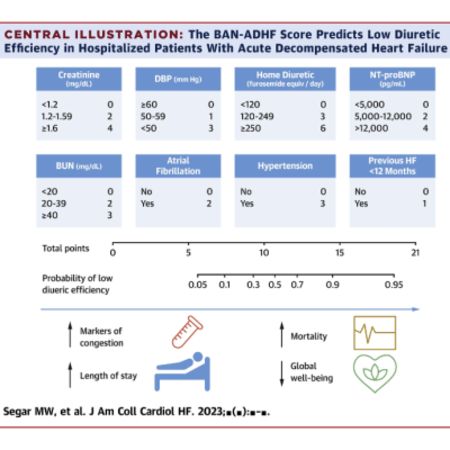A new study has paved the way for a groundbreaking approach to identifying patients with acute decompensated heart failure (ADHF) who may have a poor response to diuretic therapy. Published in the Journal of the American College of Cardiology, Heart Failure, the research introduces a machine learning-based phenomapping method and diuresis score that could revolutionize treatment strategies for ADHF patients.
Unveiling the Challenge: Identifying Low Diuretic Efficiency in ADHF Patients
ADHF patients often exhibit varying responses to diuretic therapy, posing a challenge for healthcare providers in tailoring effective treatment plans. The study, conducted by a team of researchers, aimed to address this gap by developing and validating a novel approach to identify patients with low diuretic efficiency early on. Pooling data from multiple ADHF trials, including ROSE-AHF, CARRESS-HF, and ATHENA-HF, the researchers analysed information from 794 participants to derive their findings. Using a multivariable finite-mixture model-based phenomapping technique, the team identified three distinct phenogroups based on diuretic efficiency.
Insights into Diuretic Response: Phenogroups and the BAN-ADHF Score
Results from the study revealed that phenogroup 1, comprising 47% of the participants, exhibited significantly lower diuretic efficiency compared to phenogroups 2 and 3. The study also introduced an integer-based diuresis score, known as the BAN-ADHF score, which incorporates various predictors such as blood urea nitrogen, creatinine levels, natriuretic peptide levels, atrial fibrillation, diastolic blood pressure, hypertension, home diuretic use, and heart failure hospitalization. The BAN-ADHF score demonstrated strong predictive capabilities for identifying patients with low diuretic efficiency, outperforming traditional measures such as kidney function markers and natriuretic peptide levels. Patients with higher BAN-ADHF scores were associated with poorer outcomes, including longer hospital stays, higher levels of natriuretic peptides upon discharge, and increased risk of in-hospital mortality.
Bridging the Gap: A Novel Approach to Diuretic Efficiency in Heart Failure Treatment
Dr. Matthew Segar, a third-year cardiovascular disease fellow at The Texas Heart Institute and first author of the study, highlighted the significance of these findings, stating, "Inefficient diuretic response in hospitalised patients can hinder treatment progress and increase the risk of post-discharge rehospitalization and mortality. It’s crucial to identify individuals with low diuretic efficiency early on to tailor decongestion strategies and improve clinical outcomes."
Precision Medicine in Heart Failure: The BAN-ADHF Score Offers Personalised Treatment
The study's findings have significant implications for the management of ADHF patients, offering a more precise and personalised approach to treatment. The development of the BAN-ADHF score provides clinicians with a valuable tool for early identification of patients at higher risk of poor diuretic response, enabling proactive interventions to improve patient outcomes. While the study demonstrates promising results, further validation of the BAN-ADHF score in diverse clinical populations is warranted, as put by Dr Segar “We know the BAN-ADHF score can accurately identify, characterise, and predict diuretic resistance among individuals with ADHF mathematically. Now we must take this medical knowledge and conduct a clinical study to evaluate whether implementing the BAN-ADHF score in our care protocols improves outcomes for patients hospitalised with acute decompensated heart failure.” Implementation of this innovative approach has the potential to transform the care landscape for ADHF patients, ushering in a new era of precision medicine in heart failure management.
Source & Image Credit: JACC: Heart Failure























